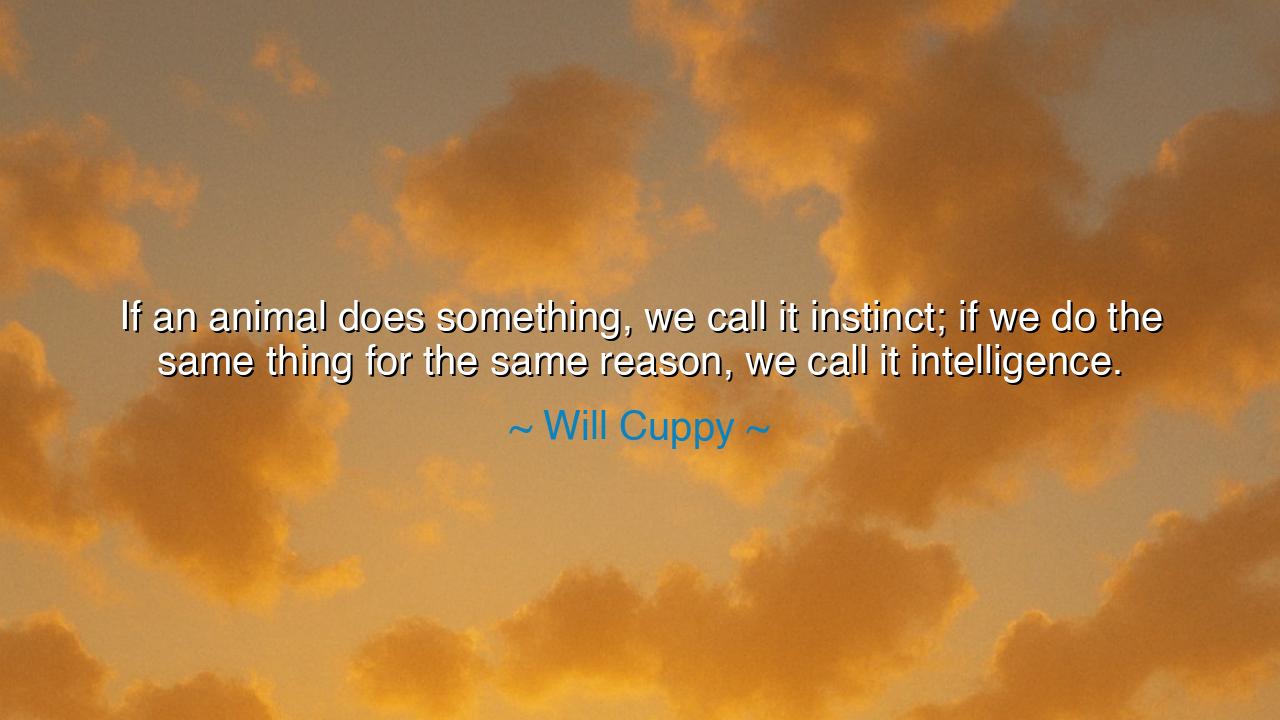
If an animal does something, we call it instinct; if we do the
If an animal does something, we call it instinct; if we do the same thing for the same reason, we call it intelligence.






“If an animal does something, we call it instinct; if we do the same thing for the same reason, we call it intelligence.” — Will Cuppy
In these wry and piercing words, Will Cuppy, the humorist and satirist of the human condition, strikes at one of the oldest illusions of mankind — the belief in our own supremacy. His statement, though cloaked in wit, carries the weight of philosophical truth: that humans, in their pride, often rename their instincts as intelligence to elevate themselves above the rest of creation. Cuppy reminds us that much of what we call reason — survival, hunger, love, fear, the drive to protect and to build — is not the crown of divinity we imagine, but the same life-force that animates the bird, the wolf, the ant, and the whale. His humor conceals a mirror, and in that mirror we glimpse ourselves — clever, yes, but not as different as we believe.
The origin of this quote lies in Cuppy’s unique style: the blend of irony and insight that marked his essays and observations on nature and humanity. Living in the early twentieth century, he wrote about animals with a tone of affectionate mockery, always contrasting their simplicity with our pretensions. Through laughter, he unveiled the deep truth that human intelligence is not a separate gift but an extension of nature’s wisdom. What we call thought often arises from the same primal currents that guide a mother bird to her nest or a lion to its hunt. By naming our instincts “intelligence,” we soothe our vanity — yet Cuppy suggests that wisdom begins when we admit our kinship with all living things.
The ancients, too, understood this connection. The Stoic philosophers of Greece spoke of the logos — the universal reason that pervades all life, human and animal alike. They taught that the same divine spark that governs the stars moves within the heart of every creature. When the spider spins its web or the bee builds its hive, they act with a wisdom beyond analysis. They need no calculation to know how to live; they follow the rhythm of existence itself. In their simplicity lies a perfection we, in our complexity, often lose. Thus, what we call instinct may, in truth, be a purer form of intelligence — unspoiled by arrogance, untouched by overthinking.
Consider the story of Konrad Lorenz, the great ethologist of the twentieth century, who devoted his life to studying animal behavior. He once observed how a flock of geese, separated from their mother, imprinted upon him, following him wherever he went. In that moment, he saw that the bond of life — the drive to belong, to follow, to love — transcended species. What we call instinct was not mindless repetition, but an emotional intelligence older than speech. These creatures, with no words, showed loyalty, affection, and trust — qualities we revere in ourselves as signs of reason and soul. Through them, Lorenz came to see that the boundary between instinct and intelligence is drawn not by nature, but by human pride.
Cuppy’s words carry also a hidden challenge. If animals act from instinct and we act from intelligence, why do we so often fail to live in harmony with the world that gave us life? The beaver builds a dam to protect its home, yet it never destroys the forest. The wolf hunts only what it needs, while man, driven by his so-called reason, consumes the earth itself. Perhaps the tragedy of humanity is that in separating ourselves from nature, we have lost the balance that instinct once gave us. The animal follows the laws of life; we invent our own — and then suffer beneath their weight.
There is a strange humility in recognizing that we are not above the animals, but among them — fellow travelers in the grand procession of life. True intelligence, Cuppy implies, lies not in denying our instincts but in understanding and guiding them. The wisdom of the ancients echoes this: “Know thyself,” said the Oracle of Delphi — not as a god among beasts, but as a creature within creation. To know oneself is to recognize the instincts that move us — love, fear, hunger, curiosity — and to use reason not to escape them, but to refine them into compassion, art, and harmony.
The lesson, then, is one of humility and awareness. Do not scorn your instincts, for they are the foundation upon which your mind stands. Learn from the creatures of the world — from their patience, their simplicity, their unspoken harmony with life. Use your intelligence not as a weapon of separation, but as a bridge to understanding. For wisdom begins not in thinking more, but in feeling deeper, in seeing yourself reflected in the eyes of all living things. The bird does not question its purpose, nor the river its course — yet both fulfill their destiny perfectly. So too must we, when thought and instinct, mind and heart, act as one.
So, my children of reason and wonder, remember the humor and the truth in Will Cuppy’s words. Do not boast of your intelligence when it merely mimics nature’s instinct, nor diminish the animal whose silent wisdom sustains the balance of the world. For in the end, the mind that forgets its origins becomes lost — but the mind that honors its instincts becomes whole. To think like a human is clever, but to live in harmony with the world — that is divine.






AAdministratorAdministrator
Welcome, honored guests. Please leave a comment, we will respond soon